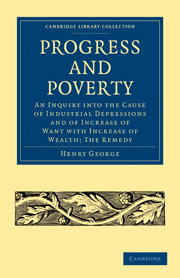 Progress and Poverty
Progress and Poverty Book contents
- Frontmatter
- PREFACE TO FOURTH EDITION
- Contents
- INTRODUCTORY
- BOOK I WAGES AND CAPITAL
- BOOK II POPULATION AND SUBSISTENCE
- BOOK III THE LAWS OF DISTRIBUTION
- BOOK IV EFFECT OF MATERIAL PROGRESS UPON THE DISTRIBUTION OF WEALTH
- BOOK V THE PROBLEM SOLVED
- BOOK VI THE REMEDY
- BOOK VII JUSTICE OF THE REMEDY
- Chapter I Injustice of private property in land
- Chapter II Enslavement of laborers the ultimate result of private property in land
- Chapter III Claim of land owners to compsnsation
- Chapter IV Property in land historically considered
- Chapter V Property in land in the United States
- BOOK VIII APPLICATION OF THE REMEDY
- BOOK IX EFFECTS OF THE REMEDY
- BOOK X THE LAW OF HUMAN PROGRESS
- CONCLUSION
- INDEX
Chapter III - Claim of land owners to compsnsation
Published online by Cambridge University Press: 07 September 2011
- Frontmatter
- PREFACE TO FOURTH EDITION
- Contents
- INTRODUCTORY
- BOOK I WAGES AND CAPITAL
- BOOK II POPULATION AND SUBSISTENCE
- BOOK III THE LAWS OF DISTRIBUTION
- BOOK IV EFFECT OF MATERIAL PROGRESS UPON THE DISTRIBUTION OF WEALTH
- BOOK V THE PROBLEM SOLVED
- BOOK VI THE REMEDY
- BOOK VII JUSTICE OF THE REMEDY
- Chapter I Injustice of private property in land
- Chapter II Enslavement of laborers the ultimate result of private property in land
- Chapter III Claim of land owners to compsnsation
- Chapter IV Property in land historically considered
- Chapter V Property in land in the United States
- BOOK VIII APPLICATION OF THE REMEDY
- BOOK IX EFFECTS OF THE REMEDY
- BOOK X THE LAW OF HUMAN PROGRESS
- CONCLUSION
- INDEX
Summary
The truth is, and from this truth there can be no escape, that there is and can be no just title to an exclusive possession of the soil, and that private property in land is a bold, bare, enormous wrong, like that of chattel slavery.
The majority of men in civilized communities do not recognize this, simply because the majority of men do not think. With them whatever is, is right, until its wrongfulness has been frequently pointed out, and in general they are ready to crucify whoever first attempts this.
But it is impossible for any one to study political economy, even as at present taught, or to think at all upon the production and distribution of wealth, without seeing that property in land differs essentially from property in things of human production, and that it has no warrant in abstract justice.
This is admitted either expressly or tacitly in every standard work on political economy, but in general merely by vague admission or omission. Attention is in general called away from the truth, as a lecturer on moral philosophy in a slave-holding community might call away attention from too close a consideration of the natural rights of men, and private property in land is accepted without comment, as an existing fact, or is assumed to be necessary to the proper use of land and the existence of the civilized state.
- Type
- Chapter
- Information
- Progress and PovertyAn Inquiry into the Cause of Industrial Depressions and of Increase of Want with Increase of Wealth; The Remedy, pp. 322 - 330Publisher: Cambridge University PressPrint publication year: 2009First published in: 1881


